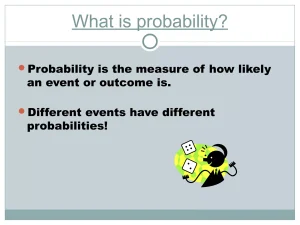
No matter if you play blackjack or roulette, odds and probability are key components of casino gambling. Understanding them will allow you to reduce risk while increasing chances of victory.
Odds are used by gamblers and gambling houses to convert estimated probabilities into wagers. Odds can be expressed as percentages such as 3-1; there are three kinds of odds: fractional, decimal and American.
Probability
Casino game odds are an integral component of the gambling experience, even though it’s possible for players to beat the house occasionally in certain games. Luckily, the mathematics behind casino games is straightforward and can assist gamblers in making smarter bets while also helping expose sucker bets which appear advantageous but actually have low probability of success.
Probability can be complex for novices, so it’s essential to have a solid grasp on its meaning before playing casino games. Odds represent the likelihood that an event will occur, such as landing red on a coin toss. They are calculated using recorded frequency of an event over multiple trials – although some casino games use different calculations when calculating odds such as Poker using different formulae versus Blackjack’s player-versus-dealer mechanic.
Odds of winning
Casino gaming hinges heavily on its odds of success; these odds serve to indicate how likely certain bets or game outcomes will be and can be expressed in many different ways, including ratios, percentages or decimals numbers. Odds vary based on game type and rules of play.
Casino games with lower house edges, such as baccarat and Keno, tend to give gamblers higher odds of success due to being less likely to be fixed by the house – a hugely beneficial aspect for gamblers looking to maximize their winning potential.
There are numerous enticing casino games with great odds, such as Blackjack and Craps, that provide numerous betting options and can be enjoyed by gamblers of all skill levels. Unfortunately, however, many misconceptions exist surrounding casino odds; one being “The Gambler’s Fallacy”, wherein someone who has lost consecutive hands thinks one will finally come through with a victory soon enough.
House edge
A casino’s house edge is an advantage built into their gambling establishment that helps it make money, which should be familiar to all players whether in-person or online. Understanding how the house edge affects games will allow you to select ones most suited to you while betting the appropriate amounts; higher house edges usually mean greater losses while low ones mean greater winning potential.
The house edge varies between casino games, depending on rules, payouts, and number of decks used. Games requiring more skill or strategy usually have lower house edges while pure chance games typically have higher ones. Knowing this information is vital for responsible bankroll management and can help avoid financial distress; furthermore it will enable you to choose games within your budget that offer higher chances of winning; but this does not indicate rigging odds against certain casino games.
Game theory
Game theory is an interdisciplinary field that investigates strategic decision-making and interactions among rational players. It has many applications across industries and fields ranging from business, computer science and mathematics – not to mention gambling! Game theory plays an essential part in helping determine the optimal strategies for players when gambling.
Calculating the odds of winning in casino games involves comparing the probability of success against all possible outcomes; for instance, one out of two coins could win when flipping them. This concept is known as expected value (EV), and its importance lies in showing that casinos do not possess an unfair monetary edge over players over time.
Understanding the math of casino games is both necessary for players and designers. With this understanding in hand, game designers can create balanced games that engage and retain players while remaining profitable for casinos. A low-variance game typically yields more consistent results while high-variance ones allow for the possibility of large wins or losses.








